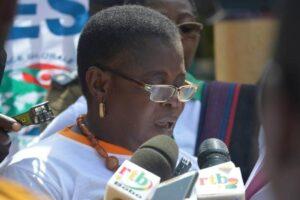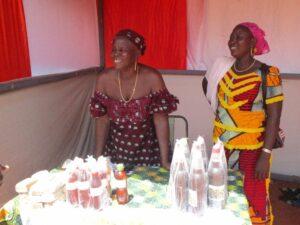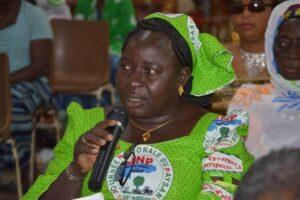Celebrating Women’s Leadership and Resilience
Women have three internationally recognized days out of the year: March 8 (International Women’s Day) October 15 (International Day of Rural Women), and November 25 (International Day to Eliminate Violence Against Women) where all eyes and hearts are on us, at least in theory.
These three days are key points in the year for the global community to pause and hopefully reflect on violence against women: physical, sexual and structural. In this regard both La Via Campesina and the World March of Women have been pioneers in highlighting the myriad ways women are oppressed in the private and public sphere – which is one of the many reasons Grassroots International is honored to partner with both of these powerful global movements.
Ending Violence against Women… Everyday
One of the largest movements in the world today, with over 200+ million small farmer members in 79 countries, La Via Campesina recognized the centrality of women in the struggle for peasant rights and economic justice from its earliest days in 1993. In 2008, La Via Campesina, issued a global call to action by launching its World Campaign to End Violence Against Women.
[A]ll the forms of violence that women face in our societies – among them physical, economic, social, cultural and macho violence, and violence based on differences of power – are also present in rural communities, and as a result, in our organizations… For this reason during this Vth Conference we decided to break the silence on these issues, and are launching the World Campaign For an End to Violence Against Women…. If we do not eradicate violence towards women within our movement, we will not advance in our struggles, and if we do not create new gender relations, we will not be able to build a new society.
– La Via Campesina, Maputo Declaration, 2008
It’s disheartening to acknowledge that the situation hasn’t improved much nine years later. In fact, in many places we’re seeing regressive and repressive body politics.
While physical and sexual violence against women is perpetuated at the individual level, even when state-sponsored or as a weapon of war, structural violence binds whole communities and generations of women in poverty. As experts have said repeatedly, moving communities out of poverty requires deep investment in women at the socio-economic and political levels. In most places, including the Global North (mission not yet accomplished!), that means a revolutionary transformation in attitudes about women’s work, women’s place, and women’s worth.
This November 25, as we acknowledge the International Day to Eliminate Violence against Women, I think of the women I’ve met in the fields of Ghana, the mountains in Haiti and bomb-damaged homes in Gaza – each pushing forward not only for her rights but the rights of her community and the care of the earth.
Rural Women’s Day – Celebrations in West Africa
It’s in this spirit of eliminating gender-based poverty (what’s commonly referred to as feminization of poverty) and structural inequity that the United Nations established the International Day of Rural Women in 2008. While rural women are critical for food production and development, they perennially lack access to basic resources and decision-making power. Each October 15 commemoration highlights and celebrates the lives and work of rural women around the world, especially in the Global South.
In many countries women cannot even own the land they farm, and if their male relative should die or leave, they have no rights to stay on the land, a situation rife with potential for physical and economic violence and abuse. While women traditionally work the land either alongside their partners or solo, they are often overlooked in official statistics. They are normally referred to as the farmer’s wife, rather than farmer, and are rarely consulted. Often these women work double duty in the field and in the home, and in my travels in West Africa, I’ve seen an overlap where women often work the land with their infant or toddlers strapped to their backs. Hard. Labor. Indeed.
But because October 15th is often overlooked, this year rural women-led members of Grassroots International grantee, We Are the Solution, staggered the celebration on three dates in three countries. Women gathered in Burkina Faso on 15 October in Bobo-Dioulasso, where they celebrated each other and met with local authorities and presented their demands for food sovereignty based in gender justice and agroecology. They once again laid bare the false narrative that insists Africa can’t feed itself without a “Green Revolution” infusion of GMO seeds and chemical fertilizers.
Rather, they proclaimed rural women on family farms have fed Africa, and will feed Africa–and this is the important part–in partnership with local and national governments that must invest in agroecology and the needed physical and technical infrastructure to help these family farms thrive. They once again made clear that agroecology is a good investment in their nations’ futures and a good climate change mitigation practice.
These same points were repeated by We Are the Solution members in Guinea on 22 October in Kankan and Senegal on 4 November in Fissil Mbadane. In issil, the National Coordinator of We Are the Solution in Senegal, Mariama Sonko, “praised the virtues of agro-ecology, which she said , aims at a social and ecological agriculture rooted in the territories. This type of agriculture, she said, will enable people to regain their autonomy, food security and stability while regenerating and preserving their food heritage. ‘The food challenge is to provide people with food that meets their qualitative and quantitative needs in a context of sustainable development.’”
In West Africa, rural women have taken the lead in ending the structural violence against women in agriculture. They advocate for a back to the future approach to agriculture that respects women’s contributions and knowledge, supports women, and respects the rights of mother earth. In other words, they talk of agroecology, which is an essential component to ending violence against women.

